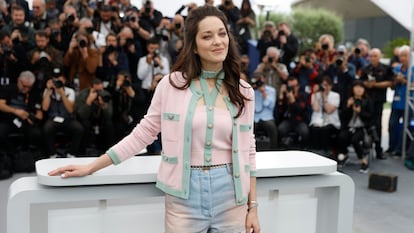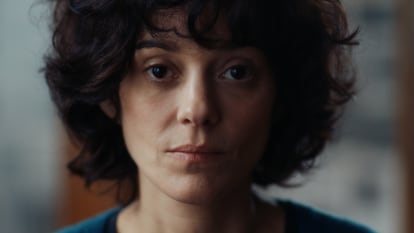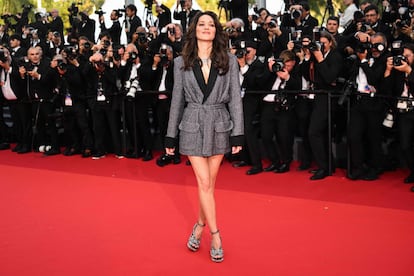Marion Cotillard: ‘When I see my movies for the first time, I always hate them’
The actress returns to the Cannes Film Festival to present ‘Little Girl Blue,’ a hybrid between documentary and fiction with sexual abuse as a backdrop

In her latest film, Marion Cotillard resurrects a dead woman. “It was very difficult. The truth is that I went a little crazy,” she admitted Tuesday at the Cannes Film Festival, in a suite overlooking the red carpet on the Croisette, where the sun was finally shining after a week of rain. The death certificate that appears on the screen in the opening moments of the film makes it clear: the cause of death of the 63-year-old woman, who died in 2016, was suicide by hanging, which took place next to the library in her home. The film begins with a question that her daughter, the director of the project, found in an old file on her computer: “Why is there always this hope of being understood after my death?”
Cotillard’s new work, Little Girl Blue, presented out of competition at Cannes, attempts to make that final wish come true. The woman’s name was Carole Achache, a writer with an irregular career and a photographer on the sets of Joseph Losey and Bertrand Tavernier. She was a chronic depressive always on the edge of the cliff, and mother of director Mona Achache, who gained plaudits at the age of 28 with The Hedgehog, her 2009 film adaptation of the bestselling book The Elegance of the Hedgehog. After her mother’s death, the filmmaker found 125 boxes full of photos, letters, objects, and audio recordings, allowing her to decipher the enigma of her disappearance, or to at least try to. “I had no choice but to face this story that I couldn’t shake off. I had to bring my mother back to life,” says Achache, sitting next to Cotillard. Her intention was to lift a supposed curse that weighed on the women in her family, although she ended up discovering that there was no evil spell, but another act of wickedness called sexual violence.

However, she did not believe she was capable of doing it alone so she decided to call Cotillard, whom she had met while on vacation at the home of some mutual friends. They didn’t know each other well, but Achache suspected that they shared a similar sensibility and, perhaps, similar experiences. “It wasn’t my story, but it felt close to me. In my family there are also women who have suffered aggression, who have had difficult and violent relationships with men,” says Cotillard, referring to her grandmother and her mother. “That taboo has been broken. More and more people now feel the need to tell their stories. It’s important that we listen to them.” In Achache’s psychodrama, which carried hints of a hybrid documentary or even somewhat vintage experimental theater, the director establishes a healing dialogue with her actress and urges her to embody the character in front of the camera, wearing her clothes and jewelry, using her perfume, imitating her voice and the way she speaks.
Little Girl Blue is connected to abuse in intellectual circles uncovered in recent years in France, following the publication of the testimonies of Vanessa Springora (Consent) or Camille Kouchner (The Familia Grande). Achache’s case is not far removed: her grandmother was the writer Monique Lange, a great figure of the Parisian salons and friend of Marguerite Duras, William Faulkner and Jean Genet. The latter would play an important role in Carole Achache’s descent into hell, as would Juan Goytisolo, to whom Lange was married for decades despite the writer’s homosexuality. In her film, Achache accuses him of covering up a case of sexual abuse in his Tangier home.
It wasn’t my story, but it felt close to me. In my family there are also women who have suffered aggression”Marion Cotillard
For Cotillard, an actress accustomed to all manner of metamorphoses, the challenge was a huge one. “I didn’t gauge the technical difficulty of the role, to which the emotional one was added,” she admits. Cotillard spends half the movie trying to imitate the inimitable. “I spent two months preparing, but I would have needed six to make it perfect.” The film’s success lies in holding a mirror up to that process, something the viewer does not usually have access to. In some scenes, the actress performs a devilish playback from the recordings left by Carole. She imitates her impossible breaths, the frenetic speed of her speech, her recurring mid-sentence stumbles. “I had already done it in La Vie en Rose [in which Cotillard plays Édith Piaf], but with music it’s easier because there is a tempo, an almost mathematical rhythm. Imitating a person is much more complex. At the beginning I suffered a lot, because I had the feeling that I was wrecking the film.”
Unlike some stars who seem full of themselves, Cotillard doesn’t usually like herself on-screen, and she doesn’t appear to say so out of any sense of false modesty. “When I see my movies for the first time, I always hate them. They don’t start to convince me until I see them a second time,” she admits. An example? “With Annette, by Leos Carax, I felt a complete rejection. Today I think it is one of the most beautiful films I’ve ever made. I’m not embarrassed to say that that first time, I focus only on my performance. And in the case of Little Girl Blue the comparison was cruel, because we see the real character on-screen all the time. It’s easy to end up losing.” Achache’s film also works as a kind of documentary about an obsessive and insecure actress — as all perfectionists are — who we watch as she tries to caress a little bit of truth, falling down but getting up again. Failing again, failing better.

Sign up for our weekly newsletter to get more English-language news coverage from EL PAÍS USA Edition
Tu suscripción se está usando en otro dispositivo
¿Quieres añadir otro usuario a tu suscripción?
Si continúas leyendo en este dispositivo, no se podrá leer en el otro.
FlechaTu suscripción se está usando en otro dispositivo y solo puedes acceder a EL PAÍS desde un dispositivo a la vez.
Si quieres compartir tu cuenta, cambia tu suscripción a la modalidad Premium, así podrás añadir otro usuario. Cada uno accederá con su propia cuenta de email, lo que os permitirá personalizar vuestra experiencia en EL PAÍS.
¿Tienes una suscripción de empresa? Accede aquí para contratar más cuentas.
En el caso de no saber quién está usando tu cuenta, te recomendamos cambiar tu contraseña aquí.
Si decides continuar compartiendo tu cuenta, este mensaje se mostrará en tu dispositivo y en el de la otra persona que está usando tu cuenta de forma indefinida, afectando a tu experiencia de lectura. Puedes consultar aquí los términos y condiciones de la suscripción digital.









































